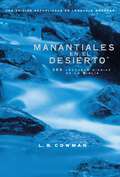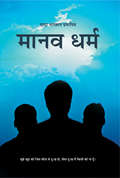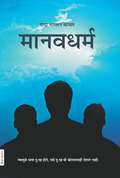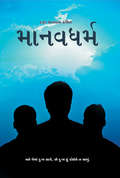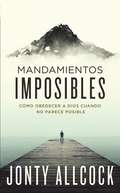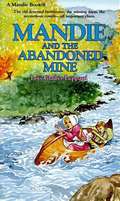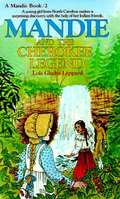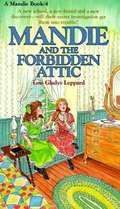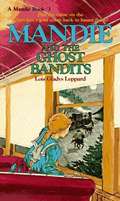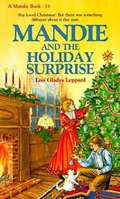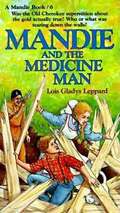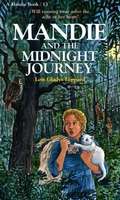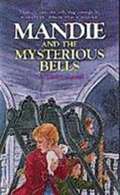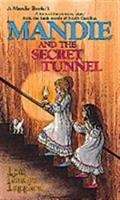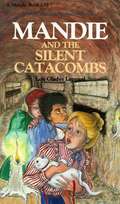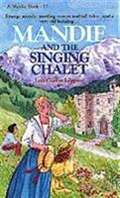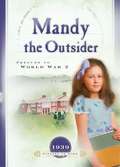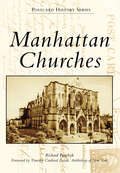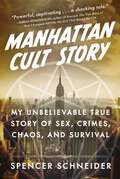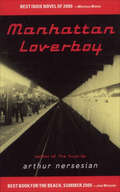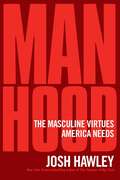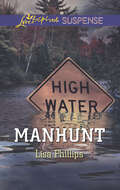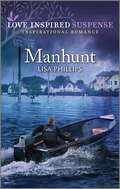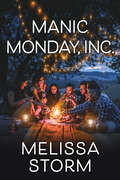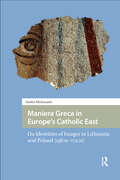- Table View
- List View
Manantiales en el desierto: Lecturas diarias de la Biblia
by L. B. CowmanEn un árido desierto, L. B. Cowman, hace mucho tiempo descubrió una fuente que la sustentó, y la compartió con el mundo, Manantiales en el desierto, una colección de meditaciones y oraciones, mensajes cristianos y las promesas de Dios, se ha convertido en uno de los más devocionales más queridos y vendidos de todos los tiempos, desde su primera publicación en 1925. Lleno de la provisión de Dios y el propósito de su plan, este clásico ha alentado y animado a muchas generaciones de cristianos. Escucho fluir los arroyos escondidos, frente a mi están las palmeras verdes y hermosas, los pájaros están cantando, todo estaba lleno con el revoloteo de las alas de los ángeles. Ahora James Reimann, editor de la aclamada edición actualizada de Manantiales en el desierto, nos trae la sabiduría del pasado en el lenguaje moderno. Con el hermoso texto contemporáneo y preciso de la Nueva Versión Internacional, el trascendente mensaje fluye fácilmente a través de estas páginas, dando dirección y esperanza a una nueva generación de creyentes. Nunca supimos que Dios tenía manantiales ocultos. Vemos una gran roca y no tenemos idea de que está cubriendo un manantial. Vemos lugares pedregosos y no nos imaginamos que oculta una fuente de agua. Dios nos dirige a través de lugares difíciles, y es ahí cuando nos damos cuenta que estamos rodeados de manantiales eternos. Día a día, Manantiales en el desierto llevará tu vida de lugares secos y desolados a lugares donde fluyen las aguas del río de la vida, y más allá, a su fuente.Las lecturas diarias Manantiales en el desierto son presentadas en la esperanza de que reaviven y refresquen a la generación actual de fieles viajeros a base de facilitarle unas devociones diarias presentadas en un lenguaje moderno y de fácil comprensión que capta hermosamente la belleza eterna del original.¿Está pasando por una experiencia de desierto? Restaure y refresque su alma por medio de las devociones que hallará en la Biblia Manantiales en el desierto.Las lecturas diarias de la Biblia NVI Manantiales en el desierto son presentadas en la esperanza de que reaviven y refresquen a la generación actual de fieles viajeros a base de facilitarle unas devociones diarias presentadas en un lenguaje moderno y de fácil comprensión que capta hermosamente la belleza eterna del original.¿Está pasando por una experiencia de desierto? Restaure y refresque su alma por medio de las devociones diarias que hallará en la Biblia Manantiales en el desierto. Todos nos encontramos, en algún punto de nuestra vida, con las pruebas y los profundos misterios de la fe cristiana. Y cuando nos llegamos a convertir en viajeros sedientos, lo que más anhelamos es que broten en nosotros el consuelo y el aliento, como un río claro y cristalino.
Manav Dharma: मानव धर्म
by Dada Bhagwanमनुष्य जीवन का ध्येय क्या है? इंसान पैदा होता है तबसे ही संसार चक्र में फँसकर लोगो के कहे अनुसार करता है| स्कूल-कॉलेज की पढाई करता है, नौकरी या धंधा करता है, शादी करके बच्चे पैदा करता है, और बूढ़े होने पर मर जाता है| तो क्या यही हमारे जीवन का मूल उद्शेय है? परम पूज्य दादाभगवान, मनुष्य जन्म को ४ गतियों का जंक्शन बताते है जहाँसे, देवगति, जानवरगति या नर्कगति में जाने का रास्ता खुला होता है|जिस प्रकार के बीज डाले हो और जिन कारणों का सेवन किया हो, उस गति में आगे जाना पड़ता है| तो, इन फेरो से आखिर हमें मुक्ति कब मिलेगी? दादाजी बताते है कि, मानवता या ‘मानवधर्म’ की सबसे बड़ी परिभाषा ही यह है कि, अगर कोई तुम्हें दुःख दे और तुम्हें अच्छा ना लगे, तो दूसरों के साथ भी ऐसा व्यवहार नहीं करना चाहिए| अगले जन्म में अगर नर्कगति या जानवर गति में नहीं जाना हो तो, मानवधर्म का हमेशा ही पालन करना चाहिए| इसके बारे में अधिक जानकारी प्राप्त करने, यह किताब पढ़े और अपना मनुष्यजीवन सार्थक बनाइये|
Manav Dharma: मानवधर्म
by Dada Bhagwanमनुष्य जीवनाचे ध्येय काय आहे? माणूस जन्म घेतो तेव्हापासूनच संसार चक्रामध्ये फसून लोकांच्या म्हणण्याप्रमाणे वागतो.परम पूज्य दादा भगवान म्हणतात, मनुष्य जन्म चार गतिंचे जंक्शन आहे. जिथून देवगति, जनावरगतिमध्ये जाण्याचा रस्ता मोकळा होतो. ज्या प्रकारचे बी पेरले आहे आणि ज्या कारणांचे सेवन केले आहे, त्या गतिमध्ये जावे लागते.मग या जन्म मरणाच्या फेऱ्यातून मुक्ती केव्हा मिळेल? दादाजी आपल्याला सांगतात की, ‘मानवता’ किंवा ‘मानवधर्माची’ सर्वोत्तम व्याख्या हीच आहे की, कोणी तुम्हाला दुःख दिले, ते जर तुम्हाला आवडत नसेल तर तुम्ही सुद्धा दुसऱ्यांना दुःख होईल असा व्यवहार करू नये. पुढच्या जन्मी नर्कगति किंवा जनावर गतिमध्ये जायचे नसेल तर मानवधर्माचे नेहमी पालन केले पाहिजे. याविषयी अधिक माहिती प्राप्त करण्यासाठी हे पुस्तक अवश्य वाचा. आणि आपले मनुष्य जीवन सार्थक करा.
Manav Dharma: માનવધર્મ
by Dada Bhagwanદરેક માનવ, જીવન જીવે છે પરંતુ તેનામાં માનવતા કેટલી છે? જન્મ, ભણતર, નોકરી, લગ્ન, છોકરાઓ, કુટુંબ, અને અંતે મૃત્યુ! શું આ રીતે જીવન ચક્ર ચાલવા નું છે? આવા જીવનનો અંતિમ ધ્યેય શો છે? શા માટે આપણે જન્મ લેવો પડે છે? આપણને શું જોઈએ છે? મનુષ્યનું શરીર આપણને મળ્યું છે... તેણે મનુષ્યની ફરજો બજાવવાની છે. જીવનમાં માનવતા હોવી જોઈએ. પરંતુ માનવતા એટલે શું? જ્ઞાની પુરુષ પરમ પૂજ્ય દાદાશ્રી માનવતાની વ્યાખ્યા આપતા કહે છે કે જયારે કોઈ તમને દુઃખ આપે, તકલીફ આપે છે ત્યારે તમને તે ગમતું નથી, તેથી, તમારે પણ કોઈને દુઃખ આપવું ન જોઈએ. તેમના કહેવા પ્રમાણે એ જ સૌથી મોટી માનવતા છે. જે કોઈ આ સમજશે અને જીવનમાં ઉતારશે એનો અર્થ કે એ માનવતા શું છે તે જાણે છે. મનુષ્યભવ મળ્યો એટલે ચારે ગતિમાંથી કોઈ પણ ગતિમાં જઇ શકે છે. એક મનુષ્ય ગતિ છે અને બીજી ત્રણ - જાનવર ગતિ, દેવ ગતિ અને નરક ગતિ. જેવા કૉઝ હશે તેવા ફળ મળશે. જો આપણે માનવતા બતાવીશું, તો આપણને આવતા જન્મમાં માનવ શરીર મળશે. જો આપણે અમાનવ થઈશું તો આવતો જન્મ પશુના શરીરમાં મળશે, જો આપણે ખુબ જ ખરાબ અને અમાનવીય થઈશું તો આવતો જન્મ નરક ગતિમાં થશે. જો આપણે આપણું જીવન બીજાના ભલા માટે અને કોઈ અપેક્ષા વગર મદદ કરવામાં ગાળીશું તો આપણને દેવગતિ મળશે. જો લોકો માનવતા સમજશે તો માનવ ભવ સાર્થક કરશે એવા ઉમદા હેતુ સાથે પરમ પૂજ્ય દાદાશ્રીએ આ પુસ્તકમાં માનવતાની ચર્ચા કરી છે.
Mandamientos imposibles: Cómo obedecer a Dios cuando no parece posible
by Jonty AllcockCuando los mandamientos de Dios suenan imposibles, la mayoría de nosotros buscamos excusas, optamos por no obecer, o pretendemos que nos va mejor de lo que estamos. En Mandamientos imposibles, el autor Jonty Allcock nos muestra que la obediencia puede ser una alegría que da vida en lugar de ser trabajo, un placer en lugar de un deber.Como creyentes, nos esforzamos por complacer a Dios a través de nuestra obediencia, pero a menudo fallamos. Por mucho que lo intentemos, el cumplimiento de los mandamientos bíblicos como «regocíjate siempre», «no tengas miedo», «da alegremente» y «ámense los unos a los otros» puede ser fácilmente eludido. Pero imaginen una vida donde la obediencia a Dios es una fuente de alegría profunda y satisfactoria. Imaginen una vida donde la obediencia no es una carga, sino el deseo y el anhelo de nuestros corazones. ¿Suena eso como un sueño imposible? Le sorprenderá saber que este es el tipo de vida que la Biblia nos anima a seguir. En este libro, el pastor Jonty Allcock nos guía a través de un proceso de cuatro pasos que nos ayudará a mirarnos menos a nosotros mismos y a depender más de Dios, permitiendo una obediencia alegre guiada por el espíritu. Los cuatro pasos implican admitir a nosotros mismos y decir lo siguiente:No puedo (honestidad sobre nuestra propia impotencia)Lo siento (pena por nuestra obstinada negativa)Por favor, ayuda (llamada esperanzadora a nuestro Padre celestial)Vamos (levantándonos y empezando a obedecer)Al enfrentarnos a las imposibles órdenes de Jesús, llegamos al final de nuestra propia voluntad y determinación, y terminamos a los pies de Jesús. Escapamos de la esclavitud de lo imposible y nos encontramos en las manos de un Dios que puede hacer todas las cosas. Donde no obedecemos, hay gracia. Donde logramos obedecer, allí encontramos el milagro de la obediencia guiada por el Espíritu.Impossible CommandsWhen God's commandments sound impossible, most of us look for excuses, choose not to obey, or pretend we are doing better than we are. In Impossible Commands, author Jonty Allcock shows us that obedience can be a life-giving joy instead of work, a pleasure instead of a duty.As believers, we strive to please God through our obedience, but we often fail. No matter how hard we try, the fulfillment of biblical commands such as "rejoice always," "be not afraid," "give cheerfully," and "love one another" can easily be circumvented.But imagine a life where obedience to God is a source of deep and satisfying joy. Imagine a life where obedience is not a burden, but the desire and longing of our hearts. Does that sound like an impossible dream? You may be surprised to learn that this is the kind of life the Bible encourages us to follow.In this book, Pastor Jonty Allcock guides us through a four-step process that will help us look less at ourselves and depend more on God, allowing for joyful, spirit-led obedience. The four steps involve admitting ourselves and saying the following:I can't (honesty about our own helplessness)I'm sorry (sorry for our stubborn refusal)Please help (hopeful call to our heavenly Father)Let's go (get up and start obeying)
Mandie And The Abandoned Mine (Mandie, Book #8)
by Lois Gladys LeppardExploring a deserted farmhouse near Uncle John's mine, Mandie and her friends discover a fancy new dress hanging on the wall. When they return the next day, the dress is gone. Ages 8-13. Mandie book 8.
Mandie and the Cherokee Legend (Mandie, Book #2)
by Lois Gladys LeppardMandie is bewildered by the unhappy reaction of some of her Cherokee friends to her discovery of gold inside a cave, and her Christian values are tested by a troublesome Cherokee cousin. This is book 2 in the Mandie Series. Reading level 4.0 interest level grades 5-8. This book has a test in the Accelerated Reader program.
Mandie and the Forbidden Attic (Mandie, Book #4)
by Lois Gladys LeppardThis is book 4 in the Mandie series. What can be causing the mysterious noises in the school attic? Mandie and a friend investigate in secret. Will they get into trouble? Reading level 4.0. Interest level grade 5-8. This is included int the Accelerated Reader program.
Mandie and the Ghost Bandits (Mandie, Book #3)
by Lois Gladys LeppardMandie and her friends attempt to unravel the mystery which includes missing gold, a train wreck, and a gang of robbers disguised as "ghosts." Book 3 in the Mandie series. Reading Level 5.4. Interest level grades 5-8. Also part of the Accelerated Reader test program
Mandie and the Holiday Surprise (Mandie, Book #11)
by Lois Gladys LeppardThough excited to be home for Christmas, Mandie realizes something's not quite right. Her mother and stepfather seem to be keeping a secret. What could it be?
Mandie and the Medicine Man (Mandie, Book #6)
by Lois Gladys LeppardSHARE SUSPENSE, MYSTERY, AND ADVENTURE WITH MANDIE AND HER FRIENDS! A Cherokee superstition seems to have come back to haunt Mandie and her friends--the gold they discovered has been donated to build a new hospital, but someone or something is tearing the walls down as fast as they can be built. The guard posted to watch the site is knocked out, tied up and blindfolded. Will Mandie be able to find her friend Joe? Will Mandie and Sallie be rescued from their kidnappers? Will Mandie learn her lesson about jumping to conclusions?
Mandie and the Midnight Journey (Mandie, Book #13)
by Lois Gladys LeppardThe school year is over and Mandie is coming home for the summer. Mandie Book readers will expect that she can hardly wait to be with her mother and stepfather, her friends and loved ones. But that's not the way it works out... Ever since Mandie's mother told her she was going to have a baby, the thought of having to share her mother with a brother or sister has caused problems for her. When she arrives home those troubling thoughts become even stronger. And the baby never stops crying! Book jacket. ages 9-12, number 13 in the Mandie Series.
Mandie and the Mysterious Bells (Mandie, Book #10)
by Lois Gladys LeppardFor children 8-13, mystery adventures set in the North Carolina backwoods at the turn of the century. This is book 10 in the Mandie series.
Mandie and the Secret Tunnel (Mandie, Book #1)
by Lois Gladys LeppardThis is the first book in the Mandie series. Mandie's father dies, and she finds out that she has an uncle. For grades 3-5.
Mandie and the Silent Catacombs (Mandie, Book #16)
by Lois Gladys LeppardMandie solves a mystery in Europe.
Mandie and the Singing Chalet (Mandie, Book #17)
by Lois Gladys LeppardOther books about Mandie are available from Bookshare.
Mandy the Outsider: Prelude to World War 2
by Norma Jean LutzTen-year old Mandy McMichael doesn't fit in at her new school in Seattle. She's very smart, but the "in crowd" teases her so much she decides to play dumb to quiet their taunts. Then there's her friendship with a Japanese family--and in 1939, with the world on the brink of war, hers is not a popular position. Using actual historical events to tell a compelling fictional story, Mandy the Outsider is a poignant tale of a girl balancing her desire for acceptance with her need to do right, and to be who God wants her to be.
Manhattan Churches (Postcard History Series)
by Richard Panchyk Timothy Cardinal DolanManhattan Churches celebrates the wonderful diversity of churches in New York City's oldest borough. The book takes an in-depth look at a wide array of awe-inspiring structures, from Lower Manhattan and Midtown to the Upper East Side, Upper West Side, and Harlem. From Trinity Church and St. Patrick's Cathedral to the Little Church Around the Corner and the Cathedral of St. John the Divine, the city's churches are a fascinating part of New York's religious, cultural, and architectural history.
Manhattan Cult Story: My Unbelievable True Story of Sex, Crimes, Chaos, and Survival
by Spencer Schneider&“We were invisible. We had to be. We took an oath of absolute secrecy. We never even told our immediate families who we were. We went about our lives in New York City. Just like you. We were your accountants, money managers, lawyers, executive recruiters, doctors. We owned your child&’s private school and sold you your brownstone. But you&’d never guess our secret lives, how we lived in a kind of silent terror and fervor. There were hundreds of us.&” Right under the noses of neighbors, clients, spouses, children, and friends, a secret society, simply called School—a cult of snared Manhattan professionals—has been led by the charismatic, sociopathic and dangerous leader Sharon Gans for decades. Spencer Schneider was recruited in the eighties and he stayed for more than twenty-three years as his life disintegrated, his self-esteem eroded, and he lined the pockets of Gans and her cult. Cult members met twice weekly, though they never acknowledged one another outside of meetings or gatherings. In the name of inner development, they endured the horrors of mental, sexual, and physical abuse, forced labor, arranged marriages, swindled inheritances and savings, and systematic terrorizing. Some of them broke the law. All for Gans. &“During those years,&” Schneider writes, &“my world was School. That&’s what it&’s like when you&’re in a cult, even one that preys on and caters to New York&’s educated elite. This is my story of how I got entangled in School and how I got out.&” At its core, Manhattan Cult Story is a cautionary tale of how hundreds of well-educated, savvy, and prosperous New Yorkers became fervent followers of a brilliant but demented cult leader who posed as a teacher of ancient knowledge. It&’s about double-lives, the power of group psychology, and how easy it is to be radicalized—all too relevant in today's atmosphere of conspiracy and ideologue worship.
Manhattan Loverboy
by Arthur NersesianOverly suspicious second novel from Arthur Nersesian, author of The Fuck-Up.Nersesian's brilliant follow-up to his underground classic, The Fuck-Up, Manhattan Loverboyis paranoid delusion and fantastic comedy in the service of social realism. Updating the picaresque chronicles in L. Frank Baum's Wizard of Oz and Kafka's The Trial, MLB is the tale of an orphan whose only known background is that of the city itself, a scaffold-covered grid sewn together with "Do Not Cross" tape. In this overly suspicious masterpiece, love is expressed through corrective surgery, and families meet across boardroom tables.Arthur Nersesian was managing editor of the literary magazine, the Portable Lower East Side. He was born and raised in New York City.
Manhood: The Masculine Virtues America Needs
by Josh HawleyNationally best-selling author (The Tyranny of Big Tech), constitutional lawyer, and U.S. senator for the state of Missouri argues that the character of men and the male virtue that goes along with it is a necessary ingredient to a functioning society and a healthy, free republic.A free society that despises manhood will not remain free. The American Founders believed that a republic depends on certain masculine virtues. Senator Josh Hawley thinks they were right. In a bold new book, he calls on American men to stand up and embrace their God-given responsibility as husbands, fathers, and citizens. No republic has ever survived without men of character to defend what is just and true. Starting with the wisdom of the ancients, from the Greek and Roman philosophers to Jesus of Nazareth, and drawing on the lessons of American history, Hawley identifies the defining strengths of men, including responsibility, bravery, fidelity, and leadership. As Theodore Roosevelt declared, the &“very existence of the state depends on the character of its citizens…. I am for business. But I am for manhood first.&” Hawley shows why the foolhardy assault on masculinity in education, the media, the workplace, and every level of government is an assault on freedom itself. Practical, down to earth, and urgent, Manhood: The Masculine Virtues America Needs is required reading for every American patriot.
Manhunt
by Lisa PhillipsCHASING JUSTICE A daring escape by a dangerous fugitive puts US marshals Eric Hanning's and Hailey Shelder's careers and lives on the line. With the criminal vowing revenge, Eric feels duty-bound to protect his risk-taking partner. He doesn't agree with her methods, but he's drawn to the single mom who wants to prove she can make it in a demanding job. When her daughter is almost kidnapped, Eric and Hailey go from uneasy partners to a true team. But with floodwaters threatening the town and a killer on the loose, can their newfound trust survive the final showdown that awaits them?
Manhunt
by Lisa PhillipsCHASING JUSTICE A daring escape by a dangerous fugitive puts US marshals Eric Hanning's and Hailey Shelder's careers and lives on the line. With the criminal vowing revenge, Eric feels duty-bound to protect his risk-taking partner. He doesn't agree with her methods, but he's drawn to the single mom who wants to prove she can make it in a demanding job. When her daughter is almost kidnapped, Eric and Hailey go from uneasy partners to a true team. But with floodwaters threatening the town and a killer on the loose, can their newfound trust survive the final showdown that awaits them?
Manic Monday, Inc. (The Sunday Potluck Club #3)
by Melissa StormLive in the moment . . . Nichole Peterson increasingly believes in rituals, routines, and checklists—especially after almost losing her father to cancer two years ago. Now she lives in constant fear of saying the wrong thing, knowing any conversation could be their last. She met her best friends—and their cherished canine companions—at the hospital right before each lost a parent. As the only member of the Sunday Potluck Club with a surviving loved one, she has a hard time opening up to her friends about the struggles that come with remission. When a new doctor diagnoses Nichole with obsessive-compulsive disorder, she refuses to accept it. Then a series of unexpected events further throws her carefully scheduled life off-kilter and her anxieties into overdrive. It seems the only person she can confide in is her best friend&’s older brother, Caleb—her polar opposite. A free spirit, Caleb treasures spontaneity, avoiding structure as much as possible. Yet he&’s the happiest person Nichole has ever met. As they grow closer, might their unlikely alliance help Nichole rediscover the more relaxed self she can scarcely remember—and even find something extra special along the way? Praise for The Sunday Potluck Club &“A poignant and touching story of friendship, love, and healing. Perfect for your book club!&” —#1 New York Times bestselling author, Barbara Freethy
Maniera Greca in Europe's Catholic East: On Identities of Images in Lithuania and Poland (1380s–1720s) (Central European Medieval Studies)
by Giedre MickunaiteHow and why does vernacular art become foreign? What does ‘Greek manner’ mean in regions far beyond the Mediterranean? What stories do images need? How do narratives shape pictures? The study addresses these questions in Byzantine paintings from the former Grand Duchy of Lithuania, contextualized with evidence from Poland, Serbia, Russia, and Italy. The research follows developments in artistic practices and the reception of these images, as well as distinguishing between the Greek manner – based on visual qualities – and the style favoured by the devout, sustained by cults and altered through stories. Following the reception of Byzantine and pseudo-Byzantine art in Lithuania and Poland from the late fourteenth through the early eighteenth centuries, Maniera Greca in Europe’s Catholic Easit argues that tradition is repetitive order achieved through reduction and oblivion, and concludes that the sole persistent understanding of the Greek image has been stereotyped as the icon of the Mother of God.
